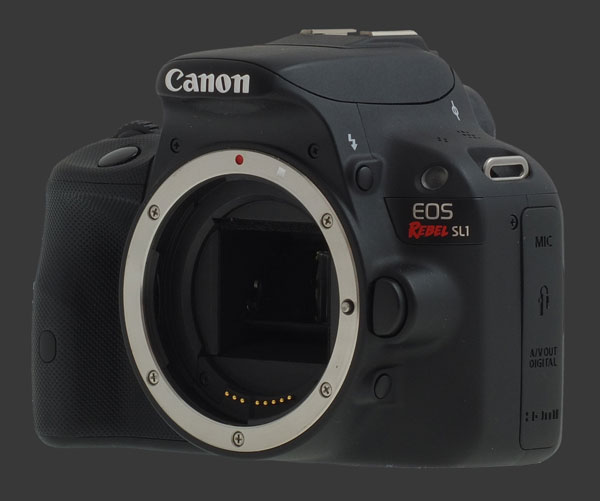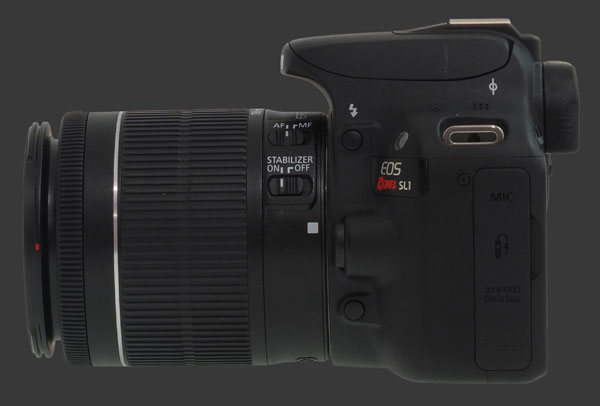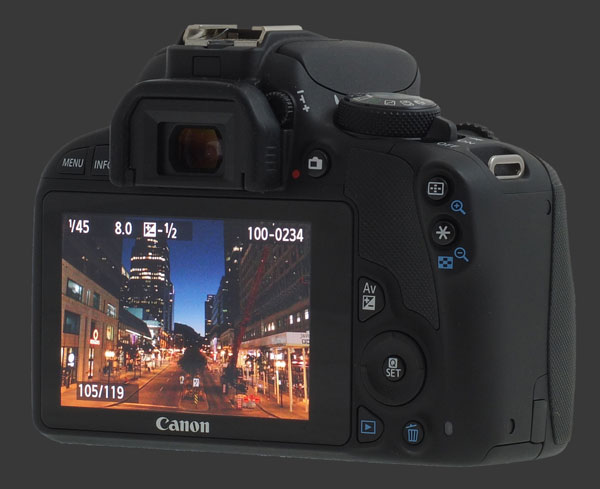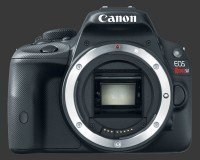Canon EOS Rebel SL1 Review
Canon EOS Rebel SL1 Introduction
The Canon Rebel SL1 is the smallest DSLR ever. It packs a second generation 18 megapixels APS-C CMOS sensor with Hybrid Phase-Detect autofocus. A standard 9-point Phase-Detect AF system is used during normal shooting, while the Hybrid AF II system covers 80% of the frame during Live-View and video capture.
The SL1 offers nearly the same feature set and controls as any other Canon Rebel DSLR. This includes full manual-controls, including Depth-of-Field preview and Spot metering, plus Custom White-Balance. A single control-dial and a cropped optical viewfinder mark it as an entry-level offering.
This DSLR features an ISO 100 to 12800, expandable to 25600, sensitivity range. It can shoot continuously at 4 FPS for a whopping 1140 JPEG images or a typical 8 RAW files. Full 1080p HD capture at 30 FPS is supported, even with a stereo audio source. There is also support for wired and wireless remote which are normally found on higher-end models.
As usual for an entry-level DSLR, the Canon Rebel SL1 offers a standard hot-shoe and standard EF-S lens mount with 1.6X crop-factor. It has a 3" Touchscreen LCD with 1 megapixel which shows a complete implementation of Live-View, including a Live-Histogram.
This review takes a close look at the Canon Rebel SL1 in terms of features, ergonomics, usability, performance and image quality.
Canon Rebel SL1 Key Features
Sensor
- 18 Megapixels APS-C CMOS sensor
- ISO 100-12800 Standard sensitivity
- Expanded ISO 25600
- Customizable Auto ISO maximum
- JPEG, RAW or JPEG+RAW Output
- Automatic sensor cleaning
Exposure
- PATM Exposure modes
- 1/4000s-30s Shutter-speed, plus Bulb
- EC, ±5 EV, 1/2 or 1/3 EV steps
- Multi-Segment, Center-Weighed, Partial & Spot metering
- AEB, 3 Frames, ±2 EV, 1/3 or 1/2 EV steps
- WB bracketing, 3 Fames, 3 step sizes
- ½ or 1/3 EV Exposure steps
Focus
- 9-Point Phase-Detect AF via OVF
- Hybrid AF II during Live-View, 80% frame coverage
- Automatic or Single-Point AF selection
- Single-Shot, Continuous, Automatic or Manual focus-drive
Images Parameters
- Automatic, Preset and Custom white-balance
- White-Balance fine-tuning, 2-axis, 19-steps
- Auto plus 6 Built-In Picture Style modes
- Sharpness, 8 steps
- Contrast, 9 steps
- Saturation, 9 steps
- Color Tone, 9 steps
- Optional Highlight Tone Priority
- Optional Auto Lighting Optimizer, 3 levels
- Optional High-ISO Noise-Reduction, 3 levels
- Optional Multi-Frame Noise-Reduction, 4 frames
- Optional Long Shutter Noise-Reduction
- Optional Chromatic Aberration Correction
- Optional Vignetting Correction
Drive
- 4 FPS Drive, Max 1140 JPEG or 8 RAW
- Self-Timer, 2s or 1-10 frames @ 10s
- Dual Wireless remote receivers
- Wired remote terminal
- Mirror Lock-Up
- Auto HDR from 3 frames
Viewfinder & Displays
- 95% Coverage viewfinder, 0.87X magnification
- 3" Touchscreen LCD, 1 megapixel
- True Live-View
- Eye-Start sensor
- DOF-Preview
Body & Construction
- Canon EF-S lens mount
- Single control-dial
- 4-Way Controller
- Standard Hot-Shoe
- NTSC/PAL output
- 1080i HDMI output
- USB 2.0 connector
- Proprietary Lithium-Ion battery
- Single SDXC memory slot
- Metal tripod mount
Video
- 1920 x 1080 @ 30 FPS
- 1280 x 720 @ 60 FPS
- Auto or Manual exposure
- Built-in mono microphone
- External stereo audio source
- Adjustable Audio-Levels
- Optional Wind-Filter
- Optional Sound-Attenuation
Canon EOS Rebel SL1 Capability - What can it do?
The Canon Rebel SL1 is an entry-level DSLR with a state-of-the-art 18 megapixels APS-C sensor with built-in Phase-Detection. This put it on par with all but one Canon cropped-sensor DSLR, the 70D with its unique 20 megapixels Dual-Pixel CMOS sensor which is capable of focusing via Phase-Detection at nearly all pixels.
With 18 megapixels of resolution, this DSLR is suitable for producing high-quality prints up to 21" x 14" which exceeds the needs of most people. Its competent ISO 100 to 25600 range gives it a good potential for low-light photography. Given its APS-C size, the sensor of the SL1 is very dense and is quite demanding of lenses.

Like other Canon APS-C DSLR, the SL1 is equipped with an EF-S lens mount. This gives it access to the most extensive lens lineup in the industry. Canon and third-parties make several EF-S specific lenses or it can accept EF lenses intended for full-frame cameras. In either case, there is a 1.6X crop-factor to consider when choosing a lens.
As an SLR, the Rebel SL1 uses mirrors to provide a view through its optical viewfinder. The viewfinder has 95% frame coverage which means that part of what gets captured is not shown. It has a 0.87X magnification which is on the small side and insufficient to judge focus precisely. This is typical of entry-level DSLRs though.
The SL1 also offers Live-View. Canon offers the best and most complete implementation there is. It addresses all the short-comings of the OVF by providing 100% coverage, accurate preview of exposure and white-balance, plus Manual-Focus Assist magnification. There is an optional Live-Histogram which remains very accurate and representative of the resulting exposure.
While using the OVF, the Canon Rebel SL1 uses a standard 9-point Phase-Detect AF sensor with a cross-type point at the center for lenses F/5.6 or faster. This is minimal. When Live-View is enabled though, the SL1 uses an interesting hybrid focusing method that combines Phase-Detect and Contrast-Detect. The former is used to approximately set focus, while the latter refines it until focus is achieved.

The new hybrid system is designed to reduce back-and-forth autofocus motion which is so disturbing during filming. This works best with lenses optimized for small incremental movements which is what Canon's STM lenses are. There are now 5 of those, ranging from ultra-wide to moderate telephoto.
Canon offers different options for the autofocus drive with the OVF than in in Live-View. For the former, the usual Single-Shot AF, Continuous AF and Servo AF are all that is available. For those not familiar with Canon DSLRs, Servo automatically chooses between Single-Shot and Continuous based on subject movement. For Live-View, options are Face-Tracking, Multiple Zone, Single Zone and Quick AF. This last option is poorly named as it is not quick at all. It uses the same Phase-Detect sensor as shooting from the OVF and therefore blanks-out the preview during focus.
Canon managed to maintain a typical feature-set on the SL1, despite its diminutive size. The usual full manual-controls, including custom white-balance and manual focus are obviously there. There are 4 metering patterns to choose from: Multi-Segment, Center-Weighed, Partial and Spot. We are glad to see Spot metering which is missing from some Canon DSLR. Partial works the same way as spot, except it uses a larger area.

The Canon Rebel SL1 can bracket for exposure or white-balance. In either case, the number of frames is fixed to 3. Steps can reach 2 EV for AEB or 3 mired for WB Bracketing. There is also a simple HDR function to blend three exposures right in-camera. There are a total of 10 Scene modes, one of which is HDR. This means that all control is relinquished at that point.
Drive modes are relatively standard on this DSLR. In addition to the usual single-frame, continuous drive and self-timers, the SL1 offers silent single and continuous drives. The self-timer runs for 2 or 10 seconds. At 10 seconds, it can take up to 10 shots. A remote can also trigger the self-timer.
The SL1 has impressive video features for an entry-level DSLR. It can record full 1080p HD video up to 30 FPS or 720p HD at 60 FPS. There is a mono microphone but it can record in stereo from an external audio source instead. Sound options are comprehensive with a built-in Wind-Filter and Sound-Attenuator. Exposure for video is either fully automatic or completely manual.
 |
Please Support Neocamera
All information on Neocamera is provided free of charge yet running this website is a huge endeavor. Purchases made via affiliate links found throughout the site help keep it running and up-to-date. There is no additional cost to you, so please consider buying via these links to our affilates:
If you found any information on this site valuable and did not purchase via our affiliate links, please considering donating via PayPal:
Any amount will be greatly appreaciated. Thank you for your support!
Canon Rebel SL1 Highlights

Sensor-Size: 22 x 15mm

Actual size when viewed at 100 DPI
| 18 Megapixels DSLR | ISO 100-12800 |
| Canon EF Mount 1.6X FLM | Shutter 1/4000-30s |
| 95% Coverage Medium Viewfinder | Full manual controls, including Manual Focus |
| Automatic Eye-Start sensor | Custom white-balance with 2 axis fine-tuning |
| Built-in Dust Reduction | Spot-Metering |
| 4 FPS Drive, 1140 Images | Hot-Shoe |
| 1920x1080 @ 30 FPS Video Recording | Stereo audio input |
| 3" LCD 1 Megapixels | Lithium-Ion Battery |
| Secure Digital Extended Capacity |
Updates
2025.01.18

Fujifilm GFX 2025 Lens Roundup
Lens Review roundup of Fujifilm GFX Medium-Format lenses. Quality, performance and handling of the GF20-35mm F/4R WR, GF30mm F/3.5 Tilt-Shift and the GF55mm F/1.7.
2024.11.18

Best 2024 Photography Gifts for Every Budget
Great gifts for photographers and photo enthusiasts selected for every budget among the best products of 2024.
2024.08.07

Eye Protection Tips for Professional Photographers
The four main considerations for professional photographers regarding eyewear.
2024.07.14

Fujifilm X100VI Review
Flagship fixed-lens compact digital camera with a 40 MP sensor and Image-Stabilization, a first for the series. Retro design featuring dual control-dials, plus direct ISO, Shutter-Speed and EC dials. Its hybrid viewfinder can switch between EVF and OVF mode.
2024.05.09

Fujifilm GFX100 II Review
Flagship 102 Megapixels Medium-Format Mirrorless Digital Camera with 8-Stop 5-Axis IBIS, 8 FPS Drive, 8K Video and 400 MP Super-Resolution capture in a weatherproof and freezeproof body with dual control-dials and dual memory-card slots.
2024.04.03

Fujifilm X-T5 Review
Newest Fujifilm flagship boasting a 40 MP APS-C sensor, 5-axis IBIS with 7-stop efficiency, 15 FPS continuous drive, 6.2K Video capture, dual control-dials and dual SDXC UHS-II slots in a sturdy weatherproof and freezeproof body.
2023.11.20

Best Digital Cameras of 2023
Find out which are the Best Digital Cameras of 2023. All the new Mirrorless Digital Cameras from entry-level to high-end professional.
2023.07.10

Fujifilm X-H2 Review
40 Megapixels APS-C Hybrid Mirrorless Digital Camera with 7-stop IBIS. Fastest shutter ever and 8K video capture. Large builtin EVF with 0.8X magnification and 5.8 MP, plus an Eye-Start Sensor. Packed with features and large number of controls in a weatherproof and freezeproof body.
2023.05.07

Sony FE 20-70mm F/4G Review
Review of the unique Sony FE 20-70mm F/4G lens. The optical zoom of this lens spans ultra-wide-angle and medium focal-length coverage, making it one of the most versatile Full-Frame lenses on the market.
2023.01.15

Huion Inspiroy Dial 2 Review
Review of the Huion Inspiroy Dial 2 tablet, a medium sized drawing surface with dual dials and customizable buttons. Connects via USB-C or Bluetooth 5.0 with Windows, Linux and Android support.
2022.12.08

How to Pack for a Photo Trip
Find out how to pack for a travel photography trip, carry your gear safely while meeting airline regulations.
2022.11.13

Best Digital Cameras of 2022
The best digital cameras of 2022. A short list of the most outstanding models in their respective categories. Choose one for yourself or as a gift.













